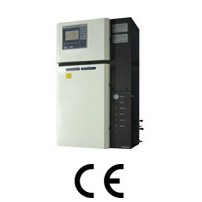| |
|
YOKOGAWA GC1000 Mark II Process Gas Chromatograph |

YOKOGAWA GC1000 Mark II Process Gas Chromatograph
|
A Gas Chromatograph analyzes a gas or volatile liquid sample by separating components for detection. The discrete separation and positive identification of components and measurement of the composition with no interference is a positive advantage of the gas chromatograph. Making good use of this advantage, the process gas chromatograph is widely used in many industries.
Yokogawa manufactures two models of the GC1000 Process Gas Chromatograph: the GC1000 S/E/C(isothermal oven type) and the GC1000 D/T/W(programmed temperature type).
The GC1000 S/E/C can analyze gas and liquid samples from room temperature up to elevated temperatures corresponding to their boiling points. The GC 1000 D/T/W is capable of performing high resolution analysis by using capillary columns similar to laboratory gas chromatograph. |
Features
|
* |
Capabilities of analyzing PIONA and the Distillation points |
|
* |
Capability of analyzing high boiling point liquid samples |
|
* |
Capability of analyzing samples in a very wide range of boiling points |
|
* |
Easy operation via User Friendly Displays |
|
* |
Enhanced maintenance using PC operation |
|
* |
Achievement of High Sensitivity TCD |
|
* |
Expectation of the effective result by EPC (Electronic Pressure Control) |
Specifications
|
Measurable object |
Gas or liquid |
|
Measurement principle |
Component separation by elution
Detection TCD, FID, FPD |
|
Measurable ranges |
TCD 1ppm to 100%
FID 1ppm to 100%
FPD 1ppm to 0.1% |
|
Number of streams to be measured |
Maximum of 31 (including standard sample) |
|
Number of components to be measured |
Maximum of 255 |
|
Analysis period |
Maximum of 99999.9 sec |
|
Quantifying method |
Absolute calibration
Sensitivity-corrected absolute calibration
Corrected area normalization |
|
Material of the sample-contact parts |
Stainless steel SS316, polytetrafluoroethylene (PTFE), fluorocarbon rubber, and glass |
|
Repeatability |
1% of full scale (2σ) |
|
* |
The value may vary depending on the specifications and conditions. For details, contact Yokogawa. | |
Analyzer specifications
|
Area classification |
TIIS Ex pd IIB+H2, T1 to T4 X
FM/CSA: X-purging, Y-purging ClassI, Div1, Groups B, C and D, T1 to T4
ATEX (CENELEC) II2G EEx pd IIB+H2, T1 to T4 |
|
Construction |
Drip-proof and dust-proof construction
(NEMA 3R, equivalent to IP53) |
|
Display |
Liquid crystal display (LCD) |
|
Operating ambient conditions |
-10 to 50℃, 95% RH or less |
|
Weight |
Approx. 120 kg (with analyzer base sampling system) |
|
GC1000S/E/W (Isothermal Oven) |
|
Volume |
40L (27L : with programmed Temp.Oven) |
|
Temperature setting |
At fixed set point |
|
Setting temperature range |
55 to 225℃ (Temperature can be set in one℃ steps.) |
|
Temperature control accuracy |
± 0.03℃ |
|
Temperature control |
PID control |
|
GC1000D/T/C (Programmed Temperature Oven) |
|
Volume |
8.6L |
|
Temperature setting |
Fixed point or programmed setting |
|
Temperature setting range |
60 to 320℃ without cooler
5 to 320℃ with cooler |
|
Heating rate |
1 to 30℃ / min (Temperature can be set in one℃ steps.) |
|
Temperature stability |
± 0.03℃ at a control point in the steady state. |
|
Stability to ambient Temperatures |
± 0.1℃ / 10℃ |
|
Stability to supply voltage variation |
0.03℃ / 10% |
|
Temperature control |
PID control |
|
Temperature sensor |
Pt100 ohm RTD with over-heating prevention function. |
Utility
|
Power supply |
100 to 120V AC ± 10%, 50 / 60 Hz ± 5% (for GC1000S/E/W), or 200 to 250V AC, 50 / 60Hz ± 5% (for GC1000D/T/C) |
|
Power consumption |
Maximum of 3.1kVA (for GC1000D/T/C)
Maximum of 1.5kVA (for GC1000S/E/W)
(depend on the specifications) |
|
Instrument air |
|
Standard (without cooler) |
|
Pressure: 350 to 900kPa |
|
Flow rate: 150 L/min or more (for GC1000D/T/C)
|
|
100 L/min or more (for GC1000S/E/W) | |
|
Dew point: -20℃ or less (depend on the specifications) |
|
With cooler |
|
Pressure:500 to 900kPa |
|
Flow rate: 300 L/min or more |
|
Dew point: -20℃ or less (depend on the specifications) | | |
|